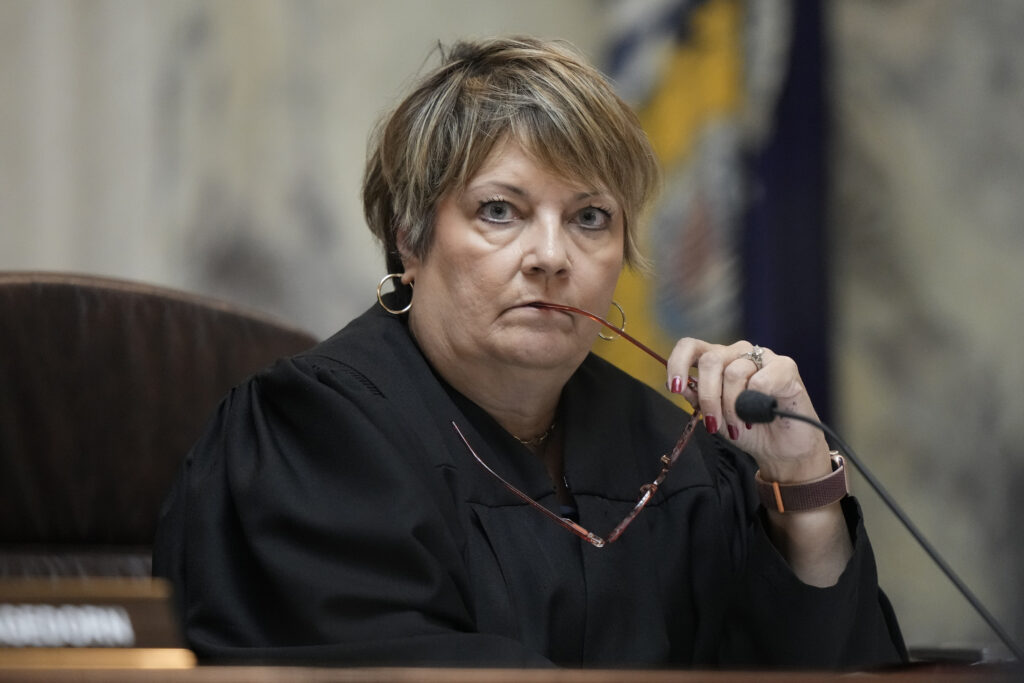
Democratic superlawyer Marc Elias is waging a full-on assault on election laws by pushing “fringe legal theories” in dozens of key states ahead of the 2024 election, according to an election law expert.
Elias recently boasted that his firm, Elias Law Group, is “now litigating 55 voting and election cases in 21 states” in the middle of an election year that will feature a contest between former President Donald Trump and President Joe Biden. Elias’s announcement also comes nearly two months after his firm won a challenge to Wisconsin’s Republican-drawn legislative maps, and he is litigating the election battleground state’s congressional maps in a separate suit.
In addition to Elias’s litigation against GOP-drawn maps, he secured one of his most “transparently partisan” successes at the Wisconsin Supreme Court this week after its Democratic majority agreed to reconsider the court’s 2022 holding in Teigen v. Wisconsin Elections Commission, which disallowed the use of ballot drop boxes in the state, according to Honest Elections Project Director Jason Snead.
“I don’t think that there is any election integrity law that is considered safe in the Wisconsin Supreme Court at this point,” said Snead, referencing the 2023 election of Justice Janet Protasiewicz, a left-wing jurist who flipped the previous Republican majority on the state’s high court.
The Wisconsin Supreme Court on Tuesday agreed to take up the drop box dispute for oral arguments on May 13. Republican Justice Rebecca Bradley wrote in a dissent that there’s no reason to revisit the decision, arguing the 4-3 liberal majority was signaling their “shameless effort to readjust the balance of political power in Wisconsin.”

A reversal of the Teigen precedent could have sweeping implications for the 2024 race, as Biden defeated Trump in Wisconsin in 2020 by just under 21,000 votes, four years after Trump narrowly won the state by a similar margin. Democrats in favor of drop boxes, which at least 29 other states allow, hope that making it easier to deliver absentee ballots will increase turnout for their side. Meanwhile, Trump and Republicans say that allowing drop boxes can facilitate cheating or incidents of voter fraud, especially given Elias’s other challenge against absentee ballot witness requirements in Minnesota.
Snead said it was “quite shocking to see a justice write a dissent so strident to say that the outcome of this case is predetermined” but noted it wasn’t that surprising because Protasiewicz signaled to voters how she would rule from the bench before she was elected.
Elias Law Group filed its lawsuit against the ballot box ban in July on behalf of two liberal-leaning organizations and a Dane County man. The lawsuit also seeks to undo a September 2022 decision by a Waukesha County judge that barred election clerks from filing missing address information on absentee ballots, though the seven justices are expected to weigh in only on the ballot box question.
“He’s been pushing a few other, you know, fairly aggressive, I’d call them fringe legal theories to try to justify his cases,” Snead said.
Another major change to Elias’s 2024 litigation strategy is that he doesn’t have COVID-19 to rely on this time to force courts to change election procedures.
In 2020, “he dressed it all up as litigation specifically targeted to deal with the problems of COVID voting,” Snead said, adding that Elias “keeps pushing the same agenda, even though the justification for that agenda is always changing.”
The Great Lakes states of Pennsylvania, Michigan, and Wisconsin are considered to be three of at least six major battleground states that will decide the winner of the next presidential election. Elias has averted his focus from election laws passed by Michigan’s Democratic-controlled legislature, though he has voiced opposition to Republican efforts to gain access to state voter roll maintenance records.
While Elias’s firm is busy in court seeking to undo laws that Republicans believe bolster election security and prevent fraud, the recent leadership overhaul to the Republican National Committee has brought with it a pivot to a “much more offensive and much less defensive” strategy for election litigation, according to Trump’s campaign adviser, Chris LaCivita. After Republicans failed to gain access to Michigan’s voter roll records, the RNC filed a lawsuit seeking to purge “ineligible” registrants, as the complaint states that at least 53 counties across the state have more active registered voters than adults over the age of 18.
“For years, Michigan Secretary of State Jocelyn Benson has neglected her duty to keep Michigan’s voter rolls clean and up to date,” Snead said, adding that in 2021, his group supported a similar lawsuit alleging Benson was in violation of the National Voter Registration Act for her refusal to clean Michigan’s voter rolls.
Benson was ultimately forced to remove 177,000 outdated registrations in 2021, “but all evidence indicates she is once again neglecting the law,” Snead added.
Meanwhile, the Elias-founded election blog Democracy Docket is working overtime to punch back at a new lawsuit filed Thursday in Pennsylvania that also takes aim at mail-in ballot drop-off locations in Allegheny County, which covers Pittsburgh, the area where Biden defeated Trump by his widest margin, by more than 150,000 votes in 2020.
“But ultimately, this lawsuit is not really about transparency, it is about continuing Republicans’ relentless attacks on all efforts that make it easier for voters to cast their ballots,” Democracy Docket said of the Pennsylvania lawsuit, which is backed by the conservative group Restoring Integrity and Trust in Elections.
Meanwhile, Republican-backed federal lawsuits in Mississippi in North Dakota that aim to outlaw the counting of mail-in ballots received after the Nov. 5 election date are gaining steam and could have cascading effects on similar laws in other states.
CLICK HERE TO READ MORE FROM THE WASHINGTON EXAMINER
Chad Ennis, vice president of Honest Elections Project, told the Washington Examiner that the suits in Mississippi and North Dakota are important because they would help push the notion that there should be a “finality” to the election, as opposed to some states, such as Illinois, that allow mail-in ballots to be counted 14 days after Election Day.
“I mean, what we saw in 2020 are these mail-in ballots kind of trickling in over the course of weeks and it … changing the outcomes. Having a deadline and an early deadline, preferably Election Day, gets finality. I mean, you’ve got to end these things sometime,” Ennis said.
Elias did not respond to a request for comment.





